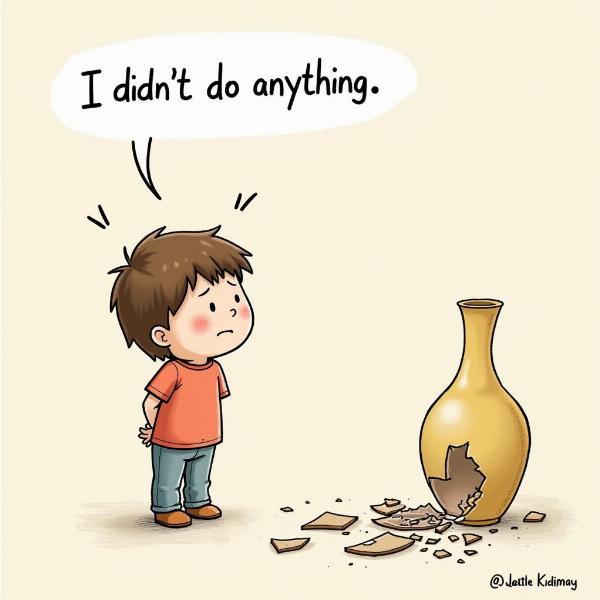Understanding the nuances of expressing innocence or denying responsibility is crucial in any language. If you’re looking to convey the sentiment of “it’s not my fault” in Hindi, this article will provide you with various accurate and culturally appropriate ways to do so. We’ll explore different expressions, from formal to informal, and discuss their contextual usage to ensure you communicate effectively.
Different Ways to Say “It’s Not My Fault” in Hindi
Several Hindi phrases capture the essence of “it’s not my fault,” each with its own subtle connotations. Choosing the right phrase depends heavily on the context, your relationship with the person you’re speaking to, and the specific situation.
Formal Expressions
- यह मेरी गलती नहीं है (Yah meri galti nahin hai): This is the most direct and literal translation of “it’s not my fault.” It’s suitable for formal settings, like professional discussions or when addressing someone senior to you.
- मैं ज़िम्मेदार नहीं हूँ (Main zimmedar nahin hun): This translates to “I am not responsible.” This phrase emphasizes a lack of responsibility rather than simply denying fault. It’s appropriate for official contexts or when dealing with serious matters.
- मुझसे कोई भूल नहीं हुई है (Mujhse koi bhool nahin hui hai): This translates to “No mistake has been made by me.” It’s a more formal and polite way to deny fault, often used when explaining a situation respectfully.
Informal Expressions
- मेरा कोई कसूर नहीं है (Mera koi kasoor nahin hai): Meaning “I have no fault,” this phrase is less formal than the options above and suitable for conversations with friends and family.
- यह मेरी वजह से नहीं हुआ (Yah meri wajah se nahin hua): This translates to “This didn’t happen because of me.” It’s a more conversational way to explain that you weren’t the cause of a problem.
- मैंने कुछ नहीं किया (Maine kuchh nahin kiya): This simple phrase means “I didn’t do anything.” It’s commonly used in informal settings, but can sound defensive in formal situations.
Choosing the Right Expression
Using the appropriate phrase is crucial to avoid miscommunication or causing offense. Consider the following when choosing how to say “it’s not my fault”:
- Formality: Use formal expressions in professional or official settings, and informal expressions with friends and family.
- Seriousness: For serious matters, opt for phrases like “main zimmedar nahin hun” to emphasize a lack of responsibility.
- Relationship: Consider your relationship with the other person. Using overly formal language with friends can sound distant, while using informal language with superiors can be disrespectful.
Common Scenarios and Examples
Let’s explore some common scenarios where you might need to say “it’s not my fault” in Hindi:
- Accidental spillage: If you accidentally spill something, you could say “माफ़ कीजिए, यह मेरी वजह से नहीं हुआ (Maaf kijiye, yah meri wajah se nahin hua)” – “Sorry, this didn’t happen because of me.”
- Misunderstanding at work: In a professional setting, “यह मेरी गलती नहीं है (Yah meri galti nahin hai)” – “It’s not my fault” – is a direct and appropriate response.
- Argument with a friend: You might say to a friend, “मेरा कोई कसूर नहीं है (Mera koi kasoor nahin hai)” – “I have no fault.”
Beyond the Phrase: Expressing Yourself Effectively
While knowing the right phrases is essential, conveying sincerity and clarity is equally important. Maintain a respectful tone, even when defending yourself. Explain the situation calmly and provide any necessary clarification.
Dr. Anika Sharma, a renowned linguist specializing in Hindi, advises, “Effective communication hinges on both the words you choose and how you deliver them. When expressing innocence, maintaining a respectful and calm demeanor is crucial for clear understanding.”
 I didn't do anything in Hindi
I didn't do anything in Hindi
Conclusion
Expressing “it’s not my fault” in Hindi requires understanding the nuances of the language and choosing the appropriate phrase for the context. Whether you’re in a formal setting or chatting with friends, this article has equipped you with various expressions to convey your message effectively. Remember to consider the formality, seriousness of the situation, and your relationship with the other person when choosing the right words. By combining accurate phrases with a respectful and clear delivery, you can confidently navigate situations where you need to assert your innocence.
FAQ
- What is the most formal way to say “it’s not my fault” in Hindi? यह मेरी गलती नहीं है (Yah meri galti nahin hai).
- How do I tell a friend it’s not my fault informally? मेरा कोई कसूर नहीं है (Mera koi kasoor nahin hai).
- Is “maine kuchh nahin kiya” appropriate for professional settings? It can sound defensive; use a more formal option instead.
- What should I consider when choosing the right expression? Formality, seriousness of the situation, and your relationship with the other person.
- How can I express myself effectively beyond just the phrase? Maintain a respectful tone, explain the situation calmly, and provide clarification.
please pardon me meaning in hindi
name ringtone maker hindi
penal interest meaning in hindi
mea culpa meaning in hindi
Meaning-Hindi.in is your trusted partner for professional Hindi translation services. We specialize in various fields, including business, legal, technical, website localization, and educational document translation. Our expertise ensures accurate and culturally sensitive translations for diverse needs, from fast turnaround projects to specialized terminology. Contact us today for your Hindi translation needs: Email: [email protected], Phone: +91 11-4502-7584. Let Meaning-Hindi.in bridge the language gap for you.